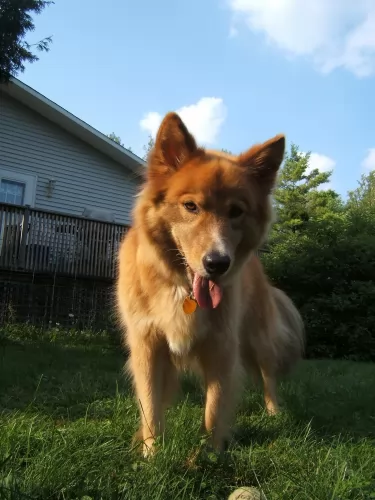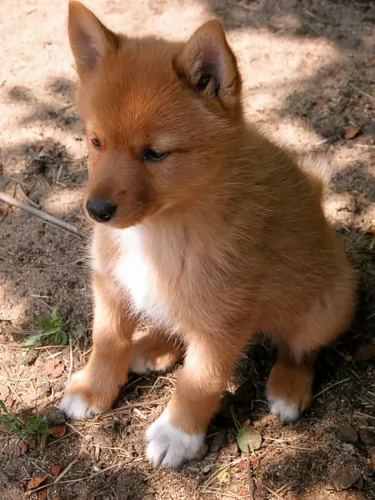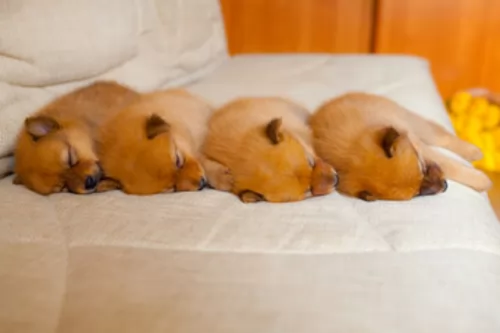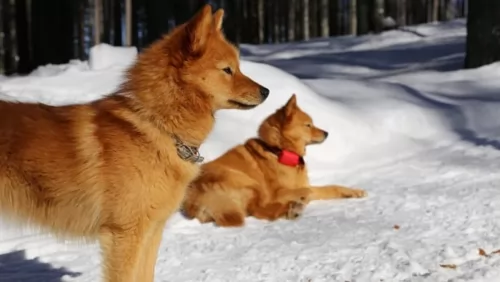 Petzlover
Petzlover Karelo-Finnish Laika is originated from Russia but Pekingese is originated from China. Both Karelo-Finnish Laika and Pekingese are having almost same height. Karelo-Finnish Laika may weigh 7 kg / 16 pounds more than Pekingese. Both Karelo-Finnish Laika and Pekingese has same life span. Karelo-Finnish Laika may have more litter size than Pekingese. Karelo-Finnish Laika requires Low Maintenance. But Pekingese requires Moderate Maintenance
Karelo-Finnish Laika is originated from Russia but Pekingese is originated from China. Both Karelo-Finnish Laika and Pekingese are having almost same height. Karelo-Finnish Laika may weigh 7 kg / 16 pounds more than Pekingese. Both Karelo-Finnish Laika and Pekingese has same life span. Karelo-Finnish Laika may have more litter size than Pekingese. Karelo-Finnish Laika requires Low Maintenance. But Pekingese requires Moderate Maintenance
 The Karelo Finnish Laika is a Spitz type hunting dog from the Karelia area of Russia.Some people say the dog developed in Sweden. The dog is from a group of ‘Laika’ breeds and has that typical Spitz-type look – the sharpish face, the erect ears and the tail which curls over the back.
The Karelo Finnish Laika is a Spitz type hunting dog from the Karelia area of Russia.Some people say the dog developed in Sweden. The dog is from a group of ‘Laika’ breeds and has that typical Spitz-type look – the sharpish face, the erect ears and the tail which curls over the back.
This attractive dog was developed as a hunting dog, and has a thick, weatherproof coat.The Karelo-Finnish Laika breed developed because people wanted a smaller sized hunting dog that could cope well with the weather, and these Laika dogs matched well.
The breed is ancient – centuries old, and after dying out in numbers during the second world war, the breed was revived when Russians imported Finnish Spitzes from Finland and bred them. The dog is similar to the Finnish Spitz, and in 2006 the Finnish Kennel Club and Russian Kennel Federation included the Karelo-Finnish Laika as a Finnish Spitz breed.
 This is an ancient dog breed that originated in China. Known also as Lion Dogs, they are toy dogs that have always been a popular choice for Chinese royals.
This is an ancient dog breed that originated in China. Known also as Lion Dogs, they are toy dogs that have always been a popular choice for Chinese royals.
DNA analysis tells us that these dogs are one of the oldest dog breeds there are and over the years, the dog has barely changed in looks.
The dogs found their way out of China, and as they started spreading to the USA and the UK, Pekingese clubs started emerging. A pekingese dog was registered by the American Kennel Club in 1906, and the Pekingese Club of America was formed in 1909.
 With his wolf-like appearance, the Karelo Finnish Laika is a sharp, intelligent dog and is the smallest Laika in Russia used for hunting. He stands at about 38–48 cm in height and weighs about 11 - 14 kg.
With his wolf-like appearance, the Karelo Finnish Laika is a sharp, intelligent dog and is the smallest Laika in Russia used for hunting. He stands at about 38–48 cm in height and weighs about 11 - 14 kg.
His coat is a reddish color and the fur is fairly long and coarse with a dense, soft undercoat. He looks like a red fox with his sharp, bright face, his erect ears, black nose and bushy tail which curls over the back.
The Karelo-Finnish Laika is a sweet dog with a quiet character. Whenever you suggest a game for him, he throws his docile side to the wind and becomes highly energetic and animated. He is an active dog and loves nothing more than a game with his human family members.
He is mistrustful of strangers, he tends to bark easily and he is territorial and all these characteristic go towards making him a good watchdog. He is quite prepared to live peacefully alongside other dogs in the home, more so when he has been trained and socialized.
He makes a great friend and pet for families and is more than ready to be loving and loyal to his human family.
 The Pekingese is a dog which stands at between 30 – 45 cm and weighs anything from 3 to 7kg.
The Pekingese is a dog which stands at between 30 – 45 cm and weighs anything from 3 to 7kg.
His double coat can be fawn, cream, apricot, grey, or black or even a mix of some of these colors.
The Pekingese is known for its flat- or squashed face and his large, bulging type of eyes. His body is low to the ground and is somewhat longer than what it is tall. He has long, silky, feathery ears and his tail is plumed and essentially held over his back. The face usually has a black mask.
The Pekingese is a stubborn, independent, intelligent dog, but with his human family he is loving and loyal. People often look at the Pekingese and think that it is a delicate dog that just wants to sit on your lap and be cuddled. But this isn’t the case and the Pekingese is a dignified, robust, bold, confident dog. He is essentially an indoors dog though and will be content for a while to lie close to his human companion. He is calm and quiet indoors but is also game for some activity, being quite a playful dog.
The Pekingese is the kind of dog that will slot easily into city or country living. He gets on well with children but if he could choose, he would prefer to live with calm, consistent adults, as he doesn’t gel too well with raucous, undisciplined children.
He is a wilful dog and will require being trained and socialized to make him obedient and more amicable.
 Sometimes when his hair has grown long and he has a ribbon in it he may be looked upon as shallow, pathetic and nothing but lapdog. In reality his heart is brave, tough, dignified and confident.
Sometimes when his hair has grown long and he has a ribbon in it he may be looked upon as shallow, pathetic and nothing but lapdog. In reality his heart is brave, tough, dignified and confident.
All the Pekingese wants is to be a normal and loving pet for the right kind of person who appreciates all his strong characteristics.
He is capable of being quite lively and protective of his human family. Give him love and treat him kindly and firmly and you’ll find out why he is such a popular dog breed.
 Apart from his good looks, the Karelo-Finnish Laika happens to be a pretty healthy breed and there are no known hereditary health problems with him. Diseases which can affect any dog -
Apart from his good looks, the Karelo-Finnish Laika happens to be a pretty healthy breed and there are no known hereditary health problems with him. Diseases which can affect any dog -
Many large breeds are prone to hip dysplasia. In hip dysplasia, joint problems cause arthritis and pain and eventually lameness. These days, when buying a puppy, people ask breeders about whether the parents were screened for hip dysplasia.
Any dog fed the wrong diet and who isn’t exercised can become overweight. Obesity in dogs is linked to many health problems in dogs. If you’re in doubt about your pet, consult with your vet on the best food for him.
Many dogs are at risk for certain types of cancer, including lymphoma which is cancer of the lymph nodes. When you are brushing your pet, check him for any unusual lumps so that you can catch cancer early.
Dilated cardiomyopathy (DCM) is where the chambers of the heart are stretched out and don't pump blood properly. Sometimes it can go undetected for a while until the dog becomes seriously ill, requiring emergency medical attention. Medications can regulate heart rhythm but there is no cure.
 The Pekingese can live to be between 10 – 15 years of age. One of the main medical problems with this dog is his squashed face which can be a source of breathing problems for him.
The Pekingese can live to be between 10 – 15 years of age. One of the main medical problems with this dog is his squashed face which can be a source of breathing problems for him.
The large, bulging eyes can also cause quite a few problems such as glaucoma, cataracts and eye ulcers. With Entropion the eyelid of the eye rolls inward and irritates the eyeball.
Your Pekingese shouldn’t be left outside as with his breathing problems, he isn’t good with regulating body temperature and can overheat in hot weather.
 The Karelo-Finnish Laika is a most attractive looking dog and his thick, double coat will need to be brushed at least twice a week to keep it free from dust, grass and burrs. He sheds throughout the year so this brushing will keep the loose dog hair under control.
The Karelo-Finnish Laika is a most attractive looking dog and his thick, double coat will need to be brushed at least twice a week to keep it free from dust, grass and burrs. He sheds throughout the year so this brushing will keep the loose dog hair under control.
Watch your Karelo-Finnish Laika’s diet as a lean, mean dog can live longer than one who is overfed. Dogs which are overweight are likely to develop joint problems and heart disease.
The quality of food you feed your pet is hugely important. Popping chocolates and peanuts into his mouth because you love him so much will be toxic for him. Apart from his top quality dry kibble, add in some cooked chicken, rice and vegetables as a tasty treat and mix in a little bit of raw meat also when you can.
Exercise for your Karelo Finnish Laika is a key component to prolonging his life, and he absolutely loves games, walks and action all the way. It will keep him in shape, keep him happy and prolong his life.
 Nothing is set in stone when it comes to the diet of your Pekingese or any other dog for that matter. How much a dog eats will depend on his breed, his age, his size and his activity levels.
Nothing is set in stone when it comes to the diet of your Pekingese or any other dog for that matter. How much a dog eats will depend on his breed, his age, his size and his activity levels.
Every dog is an individual and your Pekingese is too. Good food however dictates a lot on how healthy your pet will be so it will be to his benefit to give him the best quality commercially manufactured food there is.
He loves a bit of variety too so if you chop up some boiled chicken, brown rice and some wholesome vegetables such as carrots, spinach and sweet potato and add this to his kibble occasionally he will be delighted. He doesn’t want anything unusual or spicy because he can’t bear to have an upset stomach.
He must never be without a continuous supply of fresh, cool water.
The Pekingese doesn’t have serious exercise needs, and a little bit of running and exerting himself can have him snorting and grunting. A slowish walk outside will satisfy his exercise needs.
The coat of the Pekingese is long and thick and if you choose to keep it that way it will require brushing at least twice a week. Some people prefer to have the dog’s hair cut professionally as then it is easier to manage.